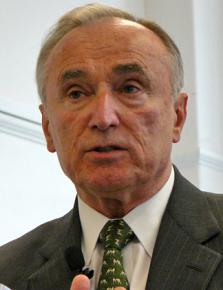Bill Bratton’s broken excuse
takes apart the NYPD commissioner's lame explanation for why young people resent the Broken Windows policy that disproportionately targets them.
NEW YORK City Police Commissioner William Bratton thinks he knows why people under 35 don't favor his "Broken Windows" policy: these kids just don't appreciate how good they've got it.
Broken Windows refers to an aggressive strategy of policing that focuses on going after so-called "quality of life" offensesm like urinating in a non-bathroom (due to a lack of public restrooms), riding a bike on the sidewalk (due to an absence of bike lanes) and loitering (a.k.a. existing) in public spaces--all of which can earn you a summons to appear in court and plead guilty before a judge or face going to trial.
Painted by the corporate media as a community improvement initiative, Broken Windows is actually the opposite. It visits unnecessary harassment, trauma and sometimes death--in case of Eric Garner--on mostly Black and Brown communities, while generating revenue and facilitating gentrification and unaffordable housing development across the city.
Bratton's remarks came after the release of a Qunnipiac poll, which showed that while 57 percent of all New York City voters approve of Broken Windows at 57 percent, a majority of those between 18 and 34 are against it. ,

Meanwhile, Bratton and City Council Speaker Melissa Mark-Viverito are in the midst of a campaign to add 1,000 more police officers to the 34,500-strong NYPD for the next fiscal year, beginning on July 1.
Many question the logic of bloating the force at a time when crime and arrest rates are steadily decreasing and funding for actual quality-of-life and community improvement initiatives--such as public housing repairs and school budgets--are falling well short of what is needed.
Even though the poll shows overall support for Broken Windows, the low favorability numbers among young people--who have been the driving force of the Black Lives Matter protests in New York and across the country--led Bratton to turn to the media to be a megaphone for his police propaganda.
"[Young people] did not experience the New York of 1990," Bratton told right-wing radio host John Catsimatidis, in an interview that was dutifully publicized by the New York Post. "They're experiencing the New York of 2015, which is a beautiful city, a safe city. That population group were not even alive, many of them, in 1990 when this city was going to hell in a handbasket."
"The 18- to 34-year-old group was the most resistant to the idea of quality of life enforcement," Bratton told Inside City Hall host Errol Louis on the local cable station NY1. "Well, if you think of when quality of life was at its worst in this city, in 1990-91, most of them weren't even born."
Rather than ask Bratton a follow-up question on his presumption of knowing why Millennials oppose Broken Windows, Lewis just chuckled.
Most of the local media has been similarly reluctant to question Bratton's logic, giving him free reign to obfuscate the most obvious reason for why young people oppose his policies: they are its primary target.
A NEW York Daily News report last year demonstrated the clear racial bias of Broken Windows policing. But the data also shows the policy to be shockingly anti-youth.
Broken Windows was first enacted in the 1990s. In 1993, only 160,000 summonses were issued. Since then, that number has skyrocketed, peaking in 2005 at 648,638 and dropping to 431,217 by 2013.
In that last year, according to a study by the Misdemeanor Justice Project at John Jay College of Criminal Justice, over 250,000 summons--almost 60 percent of the total--were given to people under the age of 35. Is it any wonder why young people show the most resistance to Broken Windows?
That mainstream media and police backers collude to spread falsehoods designed to bolster support for police is nothing new. It's just especially bold given how the Black Lives Matter movement has widely projected the problematic way in which police occupy poor and oppressed communities in major cities across the country.
Compare the New York media responses earlier this month to the deaths of two 25-year-old white men in separate work-related incidents. One was an NYPD police officer in Queens; the other, a construction worker on a high-rise hotel project in Manhattan.
A Google News search of "Brian Moore NYPD" for the last month returns 6,460 results. A similar search for "Christian Ginesi construction worker", returns only six results.
It's worth mentioning that the highest number of workplace fatalities occur in the construction industry, outpacing the number in law enforcement by hundreds.
Of course, nobody should lose their life while working to make or protect profits of someone else--both of these lives could have been spared in a different society. That's the kind of society being fought for by the youth of color who Bill Bratton dismisses as ignorant.


